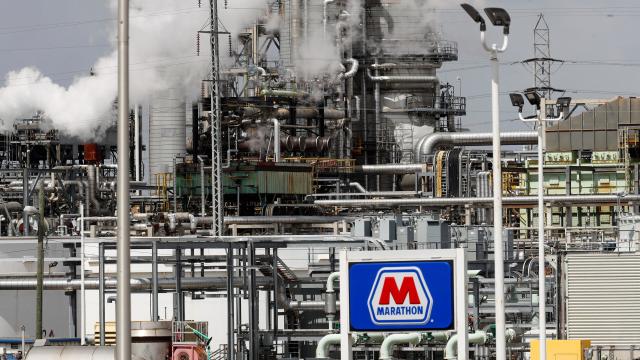Fossil fuel companies made out like bandits from last year’s government bailout. Now, new data shows that big names in the industry laid off tens of thousands of workers last year while padding their bank accounts with public money.
In a new analysis out Friday, BailoutWatch, a nonprofit watchdog group, tallied up the benefits fossil fuel companies received from the CARES Act passed last year. The group found that nearly 80 fossil fuel companies, including some of the world’s biggest names in oil and gas, snagged more than $US8 ($11) billion dollars in federal rebates. And that money didn’t seem to reach the actual workers in the industry: Documents collected by BailoutWatch show most of those same companies laid off nearly 60,000 people last year.
If you’ll recall, the oil and gas industry was in a panic last spring as demand for fuel plummeted with the start of the pandemic. Then-President Donald Trump and congressional Republicans unsuccessfully lobbied for a specific bailout just for the industry, arguing they were concerned over jobs.
[referenced id=”1684397″ url=”https://gizmodo.com.au/2021/03/big-oil-is-a-big-loser-of-money-but-also-life/” thumb=”https://gizmodo.com.au/wp-content/uploads/2021/03/31/pedsdyugfyfnuh68tlsy-300×168.jpg” title=”Big Oil Is a Big Loser (of Money, But Also Life)” excerpt=”If you’re looking to start an investment portfolio, you may want to steer clear of fossil fuels. A report released Tuesday from Carbon Tracker, a financial think tank, shows the losses for oil stocks have been piling up.”]
“I have instructed the Secretary of Energy and Secretary of the Treasury to formulate a plan which will make funds available so that these very important companies and jobs will be secured long into the future!” Trump tweeted last April. Oil magnate and Trump advisor Harold Hamm, meanwhile, told the Washington Post that he was speaking to the president on “how [the pandemic] could jeopardize…jobs and the economies in [fossil-fuel] producing states and communities across America, from Pennsylvania to California and Texas to North Dakota.”
While this industry-specific funds never panned out, the structure of some of the CARES Act’s tweaks to the tax law — which were intended by lawmakers to help companies bleeding cash retain workers — created a few loopholes. Two in particular ended up being a boon for the fossil fuel industry. One let companies offset previous years’ tax losses, and another that let them claim tax credits early. Both generated millions of dollars for oil companies, BailoutWatch found.
“Most of these programs were addressed to the larger economy to support businesses large and small during the economic downturn,” said Chris Kuveke, an analyst at BailoutWatch. “Where oil and gas benefited disproportionately was in the tax space. These benefits were targeted at companies that had been profitable in the past decade, but then suffered significantly since 2018. If you look at what’s happened to oil since 2018, it’s had a terrible three years. The tax provisions allowed companies that had been profitable but suffered even before the pandemic, which is very unique to the oil and gas space, to benefit from massive infusions of direct capital.”
BailoutWatch analysed what’s called a Form 10-K, a tax document that the Securities and Exchange Commission requires big companies to complete each year, to compare the number of workers enrolled at the end of 2019 to the end of 2020. They then compared those numbers to the total amount of bailout money each company had received through the tax breaks, which they’d calculated in a report issued last year.
The numbers are pretty striking. Marathon Petroleum received more than $US2 ($3) billion in tax benefits from the CARES Act, yet laid off more than 1,900 of its workers — a 9% cut to its payrolls. The SEC filings show that 880 of the workers laid off were covered by a collective bargaining agreement — aka, were in a union. (The company told The Guardian it had to make “the very difficult decision” to cut positions, and gave healthcare and benefits to those laid off.) Occidental Petroleum, meanwhile, got $US195 ($256) million in rebates, but still laid off 2,600 people, an 18% cut.
Seven of these companies, the analysis finds, directly benefited from a specific program designed to keep workers on payroll — and yet still laid folks off. Houston-based U.S. Well Services, an oilfield services company, got a $US10 ($13) million loan from the Small Business Administration’s Paycheck Protection Program. Yet its SEC filings show it still laid off 233 workers, a more than 25% cut. The company didn’t respond to an inquiry about this loan. Not all companies took this route; a Houston Chronicle analysis published last year showed those loans saved tens of thousands of jobs in Texas.
You may be wondering, as I am — where did all this money go, if not to keep people employed? It’s a good question, and one that Kuveke said we may learn more about as companies continue to release tax documents.
“Marathon, for instance, had $US10 ($13) billion in losses in 2020, so some of this money certainly went to the company to maintain payroll for the people they did keep on — they employ tens of thousands of people,” he said. “But they also chose to maintain other, more questionable programs, like their dividend programs for investors and investor compensation.”
Kuveke said that there are other benefits for powerful employees, like the use of private jets and executive bonuses, that may be hidden in proxy statements that could come to light with further digging. And we should do a little bit more digging. This is public money. Moreover, oil companies wield tremendous power over our political system, which is in part how they’re able to take advantage of loopholes like this.
“This CARES Act was predominantly set up to support the economy and maintain employment, and it’s very clear that the funds these companies received were not exclusively used to maintain payroll — they were used to benefit executives and shareholders,” Kuveke said. “I don’t think people would be very comfortable knowing that that’s what their tax dollars are going to.”
